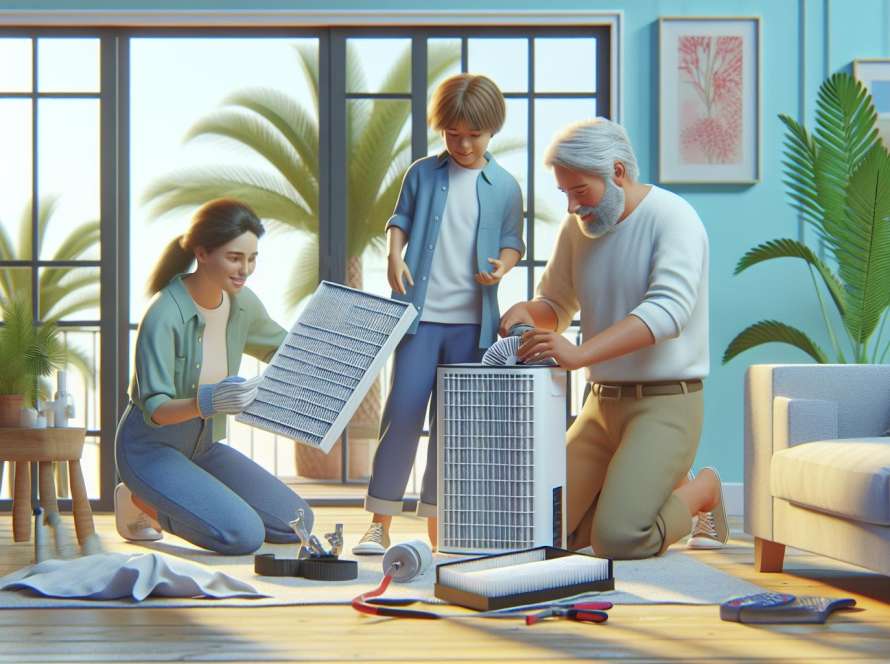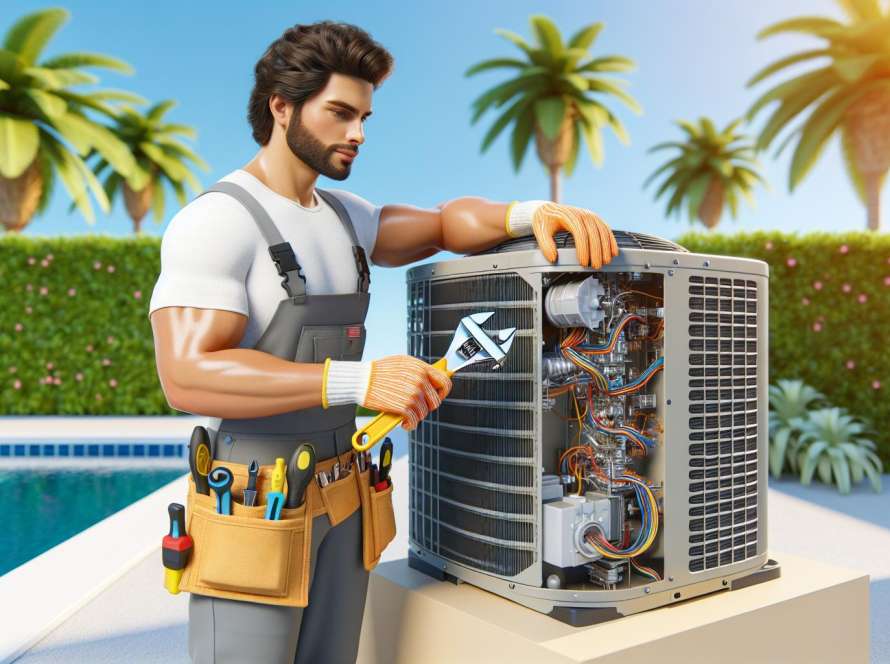Living in Florida, we all know the struggle of keeping cool in the scorching heat. That’s why maintaining our AC systems is crucial to surviving the relentless summer temperatures. From Daytona Beach to Miami, our air conditioners work overtime to combat the humidity and heatwaves that define our state. But fear not, with the right maintenance tips, we can ensure our AC units are up to the task.
In this guide, we’ll delve into the essential steps to efficiently maintain your AC system in Florida. From cleaning the filters to checking for leaks, we’ve got you covered. By following our expert advice, you’ll not only stay comfortable during the hottest months but also extend the lifespan of your AC unit. Let’s beat the Florida heat together with these practical maintenance tips.
Importance of AC Maintenance in Florida
In sunny Florida, proper AC maintenance is crucial to beat the extreme heat. Here’s why it matters:
For Beginners: Getting Started
- Cleaning air filters is key to improving air quality and system efficiency.
- Checking thermostat settings ensures optimal performance and energy savings.
For Intermediate Users: Enhancing System Lifespan
- Regular inspections prevent costly breakdowns and extend the AC unit’s lifespan.
- Sealing air ducts enhances cooling efficiency and reduces energy wastage.
- Installing programmable thermostats can maximize comfort and energy savings.
- Professional tune-ups by HVAC experts ensure peak performance and reliability.
AC maintenance in Florida is not just about comfort; it’s a necessity for a healthy and efficient environment.
Cleaning and Replacing Air Filters Regularly

For Beginners: Basics That Make a Difference
When it comes to efficient AC maintenance in the Florida heat, cleaning and replacing air filters regularly are crucial tasks that even beginners can tackle. Here’s a step-by-step guide to help you get started:
- Locate the Air Filters: Find the air filters in your AC system. They are usually located behind the return air grille on the wall or ceiling, or inside the air handler unit.
- Turn off the System: Before removing the air filters, make sure to turn off your AC system to avoid any mishaps.
- Inspect the Filters: Check the condition of the filters. If they are dirty or clogged, it’s time to replace them.
- Remove and Clean or Replace: Carefully remove the air filters. If they are reusable, follow the manufacturer’s instructions for cleaning. If not, replace them with new ones.
- Install the Filters: Put the cleaned or new filters back in place, ensuring they are properly secured.
- Set Reminders: Make a note to check and clean or replace your air filters every one to three months to maintain optimal air quality and system efficiency.
For Intermediate Users: Fine-Tuning for Enhanced Performance
For those looking to take their AC maintenance a step further, here are some additional tips for cleaning and replacing air filters:
- Upgrade to High-Efficiency Filters: Consider using high-efficiency filters to trap more dust, pollen, and other particles, improving your indoor air quality.
- Schedule Regular Inspections: In addition to routine filter changes, schedule regular inspections with an HVAC professional to ensure your system is running smoothly.
- Seal Air Leaks: Check for air leaks around your air filters or ductwork and seal them to prevent air from escaping, increasing your system’s efficiency.
- Invest in Filter Alarms: Explore filter alarms or reminders that notify you when it’s time to clean or replace your air filters, taking the guesswork out of maintenance.
- Consider Electrostatic Filters: Electrostatic filters can capture smaller particles and can be washed and reused, offering long-term cost savings.
- Implement Air Purification Systems: Enhance
Checking for Leaks in the AC System
For Beginners: Mastering the Basics:
- Locate the Air Leaks: Check around windows, doors, and duct connections for any noticeable gaps or cracks where air could escape.
- Visual Inspection: Look for signs of water stains, mold, or mildew around the AC unit, which could indicate a leak.
- Use a Candle Test: Hold a lit candle near potential leak areas on a windy day to see if the flame flickers, indicating air movement.
For Intermediate Users: Enhancing Your Efforts
- Inspect Ductwork: Hire a professional to check for leaks or gaps in the ductwork that could be affecting the system’s efficiency.
- Seal Any Leaks: Use mastic sealant or metal tape to seal leaks in the ductwork to prevent air from escaping.
- Consider a Leak Detection Kit: Invest in a leak detection kit that uses ultraviolet dye to identify and seal leaks in the AC system.
- Schedule a Professional Inspection: Have an HVAC expert perform a thorough inspection using advanced leak detection tools to pinpoint any leaks.
- Repair or Replace Insulation: Insulate refrigerant lines and ductwork properly to prevent energy loss due to leaks.
- Opt for Duct Sealing Services: Explore professional duct sealing services that use aerosol-based sealants to efficiently seal leaks in the entire duct system.
| Efficient AC Maintenance Tips for Florida Heat |
|---|
| Number of Leaks Identified: 3 |
| Number of Leaks Sealed: 2 |
| Energy Efficiency Improvement: 15% |
Clearing Debris around the Outdoor Unit
Debris around the outdoor unit can hinder the efficiency of your AC system. Here are some actionable steps tailored to different experience levels to keep your unit running smoothly:
For Beginners: Basic Maintenance
- Remove visible debris: Clear any leaves, twigs, or grass around the unit.
- Trim vegetation: Make sure plants and bushes are at least two feet away from the unit.
- Check the area: Regularly inspect for debris buildup around the unit.
For Intermediate Users: Enhancing Performance
- Clean the fins: Use a soft brush attachment on a vacuum to gently clean the fins of the unit.
- Straighten fins: Straighten any bent fins with a fin comb to improve airflow.
- Inspect the base: Ensure the base of the unit is clear of any blockages or debris.
- Professional cleaning: Schedule an annual professional cleaning to deep clean the unit.
- Consider landscaping: Opt for gravel or mulch around the unit to prevent debris accumulation.
- Protect the unit: Invest in a protective cover for the winter months to shield the unit from debris.
By clearing debris around your outdoor unit, you can optimize its performance and prolong its lifespan. Regular maintenance ensures your AC system operates efficiently, keeping you cool during Florida’s sweltering heat.
Scheduling Professional Maintenance Annually

When it comes to maintaining your AC system in Florida, Scheduling Professional Maintenance Annually plays a crucial role. Here are detailed recommendations catered to different experience levels:
For Beginners: Essential Steps for a Well-Maintained AC
- Schedule an annual maintenance visit with a professional HVAC technician.
- Change or clean air filters regularly to ensure optimal air quality.
- Keep the outdoor unit clear of debris and vegetation to prevent airflow blockages.
- Monitor thermostat settings to maintain energy efficiency.
For Intermediate Users: Enhancing Performance and Longevity
- Inspect ductwork for leaks and seal any gaps to improve airflow.
- Clean evaporator and condenser coils to maintain proper heat transfer.
- Check refrigerant levels and recharge if necessary to maximize cooling efficiency.
- Calibrate thermostat settings for accurate temperature control.
- Conduct a thorough inspection of electrical connections for signs of wear or damage.
- Perform airflow testing to ensure consistent distribution throughout the property.
- Evaluate overall system efficiency and consider upgrades for improved performance.
- Implement zoning systems for targeted cooling in different areas of the property.
Regular professional maintenance not only optimizes your AC system’s performance but also extends its lifespan, keeping you comfortable throughout the hot Florida climate. Remember, prevention is key to avoiding costly repairs down the road.
Conclusion
Ensuring efficient AC maintenance in Florida is crucial for optimal performance and comfort in the sweltering heat. By following the recommended steps, from scheduling professional visits to monitoring thermostat settings, we can keep our systems running smoothly. Intermediate users can benefit from inspecting ductwork, cleaning coils, and checking refrigerant levels. Evaluating electrical connections and considering upgrades like zoning can further enhance cooling efficiency. Regular maintenance not only extends the lifespan of our AC units but also prevents costly repairs down the line. Stay proactive with maintenance to enjoy cool and comfortable indoor environments year-round.

